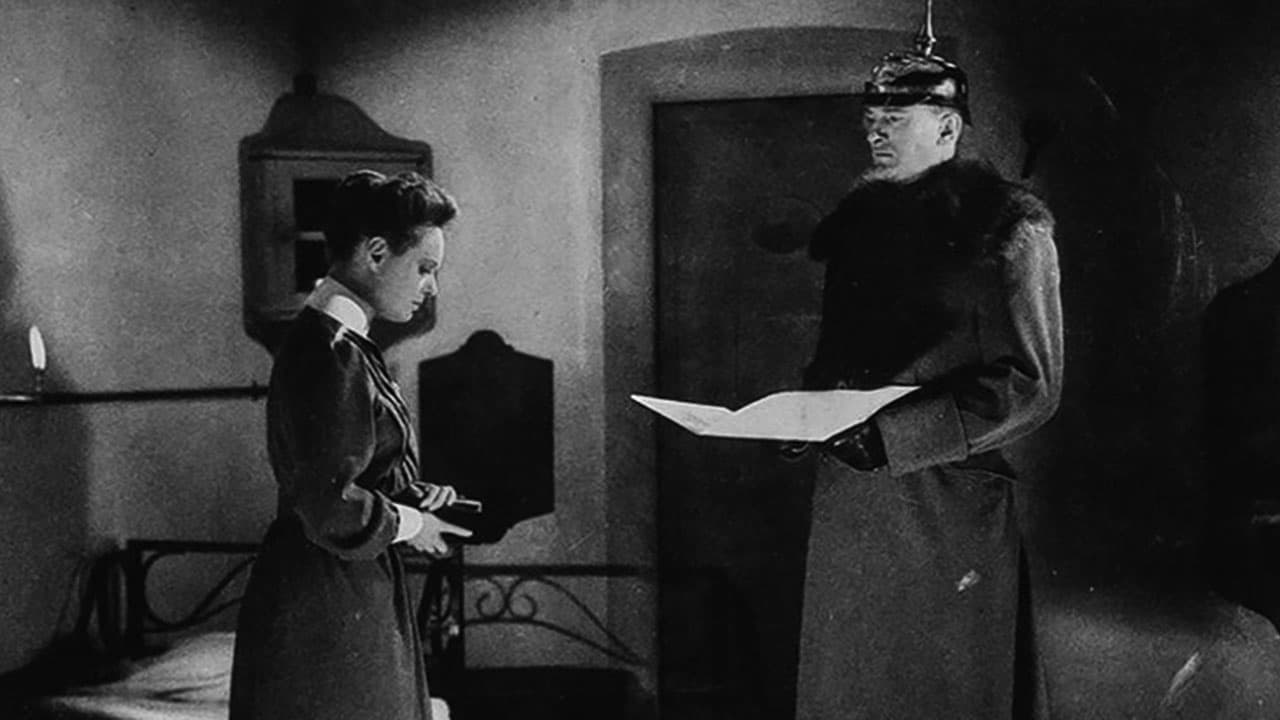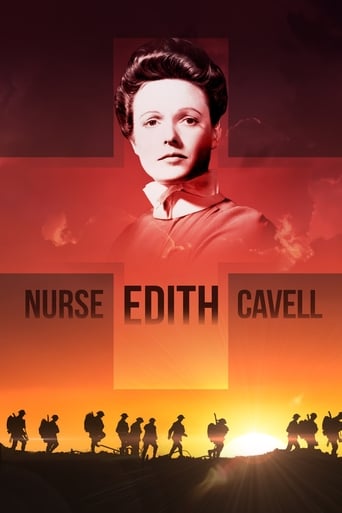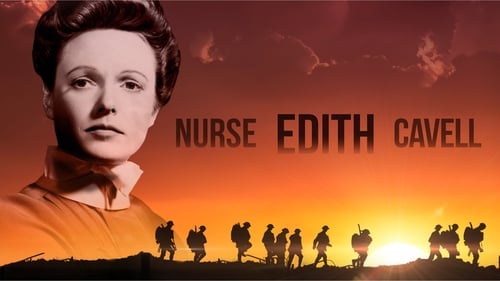


Good concept, poorly executed.
... View MoreExcellent, a Must See
... View MoreThe film's masterful storytelling did its job. The message was clear. No need to overdo.
... View MoreIf you're interested in the topic at hand, you should just watch it and judge yourself because the reviews have gone very biased by people that didn't even watch it and just hate (or love) the creator. I liked it, it was well written, narrated, and directed and it was about a topic that interests me.
... View MoreAnna Neagle who had previously played Queen Victoria plays the title role in Nurse Edith Cavell, a woman who became a symbol for British feminism and patriotism with her death a martyr to the Allied cause in World War I. Later on Neagle would also play Florence Nightingale the woman who created the nursing service in the British Empire as a profession for women. In a sense Cavell owed the life she led and her death to Florence Nightingale.We only see Cavell's life in those last couple of years. She was a British subject and was living in Belgium where she was on a mission, creating a female nursing service in that country when war broke out.For reasons I don't understand as an open British subject she should have been summarily interred when war was declared. But the Germans did not do that, instead they let her work in their hospitals where she tended both German and Allied wounded. By all accounts her conduct was exemplary, she was a nurse first. Later on she organized a group that helped Allied prisoners who escaped get to neutral Netherlands or unoccupied France. It took some doing but with Captain George Sanders of German Intelligence Cavell was apprehended.Shooting her shocked the world however and doing it on a charge of treason was highly dubious since she wasn't a German subject. The American minister to Belgium tried to intervene, but the Germans were intransigent on the death penalty. Cavell was shot by a firing squad and became a British heroine.Cavell was 50 when she was killed and Anna Neagle was way too young for the part. But throughout the film she carries herself with restraint and dignity and her portrait is superb. She is nicely assisted by such players as Edna May Oliver, May Robson, and Zasu Pitts all coming from America for this film. Sanders as usual is the perfect ruthless and inhuman hun. The film in America was released by RKO and on September 1, 1939 just as the war in Europe broke out. There was more than an inkling that this war would be against a Germany light years more ruthless than the Wilhelmine Monarchy ever was.The copy I saw and rented from Amazon is in sad need of restoration. It should be as a tribute to a British heroine portrayed by one of the United Kingdom's greatest cinema stars.
... View MoreDeeply moving dramatisation of the heroism of the English nurse Edith Cavell and her Belgian supporters, who smuggled about 200 Allied soldiers and airmen out of German-occupied Belgium until she was caught, tried and on 12 October 1915 shot at dawn. Notable for the immense restraint and dignity shown by Anna Neagle in the title role, caring equally for wounded German troops and completely unafraid of blustering German officers. A devout Anglican, above her duty to her country she placed the overriding duty of saving life.Diplomats at the Brussels embassy of the neutral USA made huge efforts to save her life once captured but the Germans were implacable. After the war, her disinterred remains were given a state funeral in Westminster Abbey and then reburied at Norwich Cathedral. This film came out as sacrifices were again being asked from English women, while the USA watched Belgium being crushed a second time by an even more vicious German regime.
... View MoreI was very surprised when I watched this biography because so often these sort of films are so inaccurate and overdone. I can't help but immediately think of some wretched films about Abraham Lincoln or Cole Porter--films that bore little similarity to the actual lives of those supposedly being portrayed and abounding in false sentimentality. Considering that this film was made around the same time WWII began, I would have expected the film to be even more inaccurate and jingoistic than normal--making the real life Edith Cavell into some sort of saint and the Germans brutal monsters. However, the film turned out to be a very accurate portrait of her life during WWI--free of the overwrought aspects I assumed would be present throughout the film. To verify just how close the film stuck to the facts, I checked on the internet and found an amazingly comprehensive site on Ms. Cavell--and the film seemed very close to her actual life (http://www.edithcavell.org.uk/).The story begins just as World War One is about to commence. Edith Cavell is a highly respected nurse in Belgium. However, after the Belgians are quickly dispatched by the German army, she must live and work in occupied Belgium--during which time she took care of wounded German soldiers. However, when Allied soldiers stumbled into the hospital looking for assistance, Ms. Cavell agreed to shelter them and eventually help them escape to neutral Holland. Eventually the number of soldiers she helped reached about 200 before she was captured and executed by the Germans. At the end of the film, you cut to 1919 and you see her being re-buried back in England with full honors for her brave humanitarian work. I thought this was Westminster Abbey, though it turned out (according to the web site) to be Norwich Cathedral.While this isn't the most exciting film I have ever seen, as far as 1930s and 40s bio-pics go, it's one of the best. Not only does it stick close to the facts, but Anna Neagle's performance is understated and free of the usual shrill theatrics of biographical films. Well made throughout and my only complaints are not the fault of the original production (the print was in absolutely horrid shape--with terrible sound and lots of rough film).
... View MoreBefore her popular "London Suite" escapism of the late 40s Anna Neagle achieved early fame for her biopics - Nell Gwyn, Queen Victoria & Amy Johnson portrayed with dignity & feeling,when necessary. This was even more evident in Edith Cavell under the sincere & sympathetic direction of husband,Herbert Wilcox. Her martyrdom & heroism to both her calling & beliefs that "patriotism is not enough" was commemorated after WW1 with the erection of a famed statue in London's Charing X Road,still there, so in the film the ending was never in doubt. Wilcox repeated his 1928 "Dawn" with Sybil Thorndyke without histrionics or dramatics and a bunch of popular stars in more untypical reserved roles except George Sanders who was getting into his stride after "Lancer Spy" as the stiff,autocratic Hun determined to uphold the intransigency of the "rules of war" & expediency irrespective of pleadings of British diplomats up to the very last and the decision of the court-martial against this dignified British nurse - all of which Kubrick later reflected so vividly in "Paths Of Glory". It is interesting to compare the Hun his descendant/counterpart, the Nazi and his downfall - each had their degrees of corporate conquest & world domination whatever the cost. The basic tale of Nurse Cavell running her small Belgian underground escape route for soldiers & fliers under the noses of the enemy is narrated in brief factual episodes. The short closing scenes of her arrest,brief imprisonment,quick execution & memorial service in Westminster Abbey are moving & dignified as directed by Wilcox, a name in high regard among British filmgoers for almost 20 years irrespective of their unfortunate later bankruptcy. By this time Anna Neagle's figure & appearance as a dancer had changed noticeably since her earlier buxom parts in such as "The 3 Maxims"(Later remade as "Trapeze")doing very realistically what Betty Hutton did very realistically later for de Mille. Regrettably, many copies of this rarely seen film have deteriorated especially the sound track which can be muffled & inaudible. Happily,my video copy was taped before it reached this state.
... View More